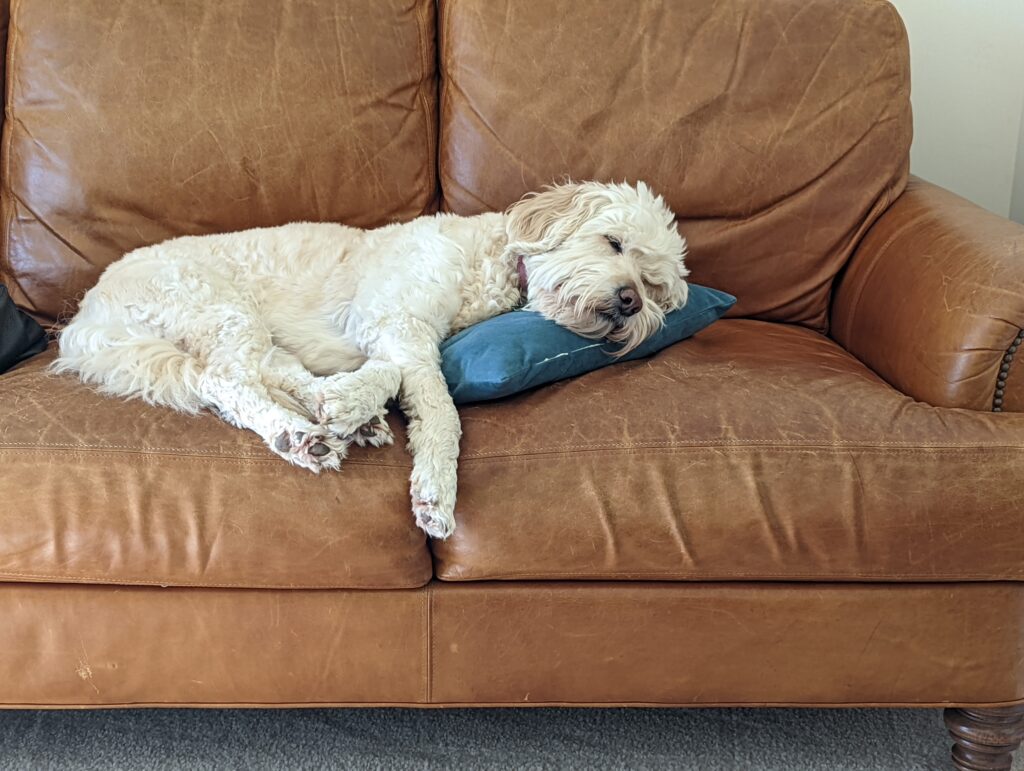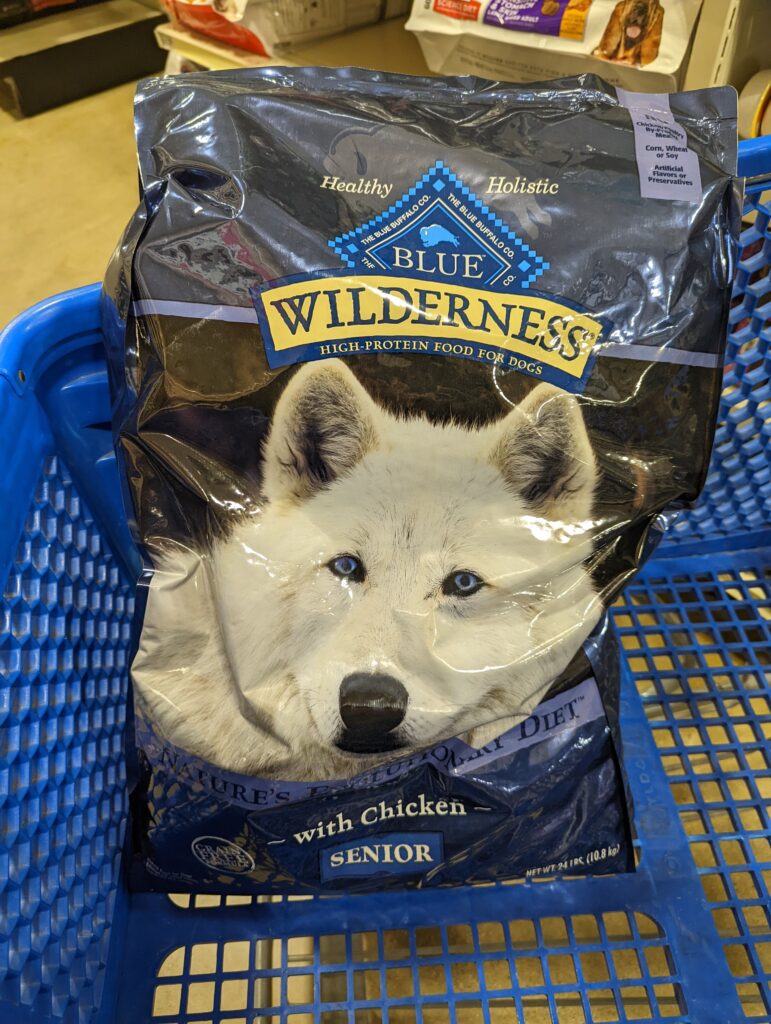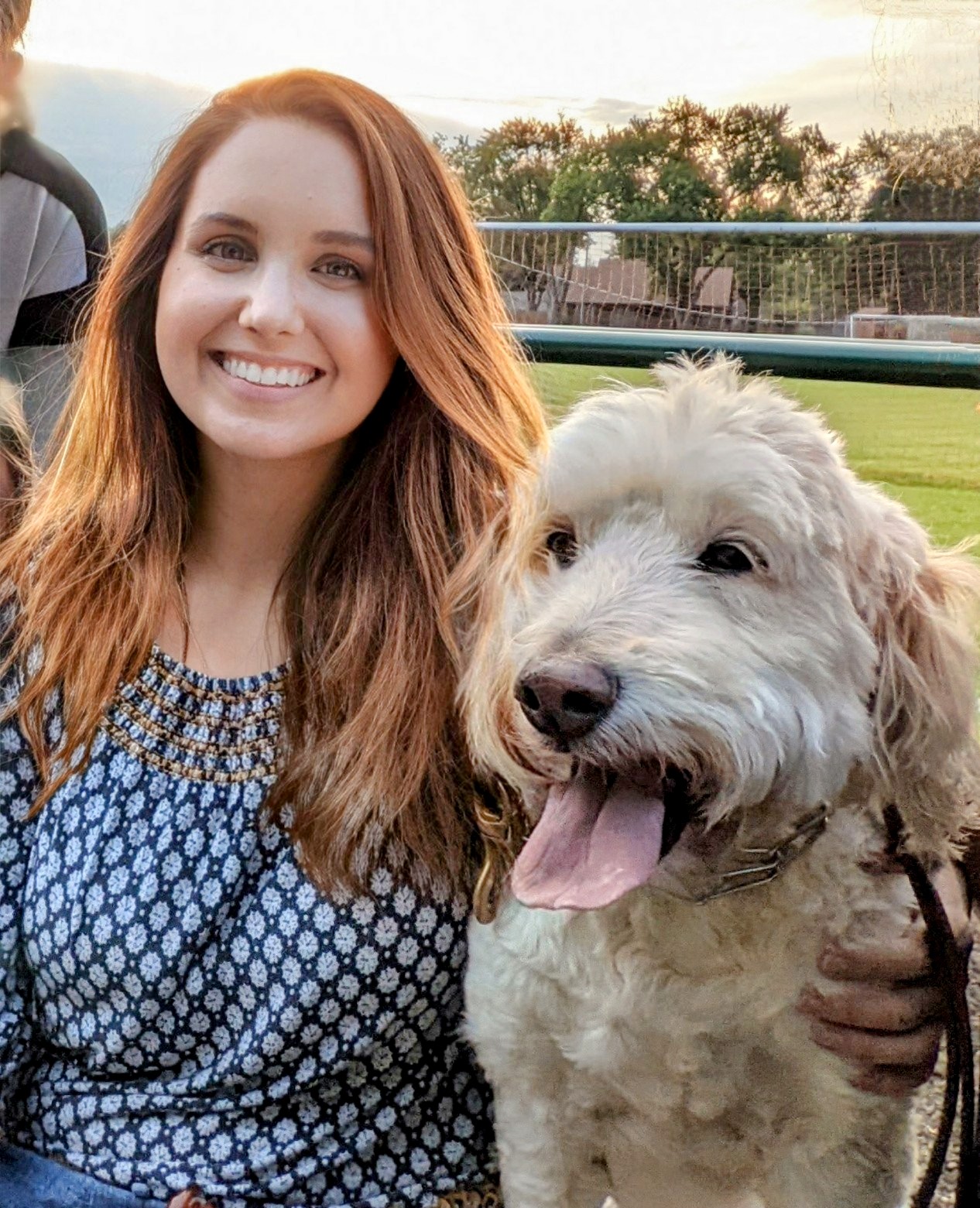How does time go by so fast? One moment you’re brining your goldendoodle puppy home and the next thing you know, she’s twelve years old! Well, that’s what I’m going through anyway – my beloved Goldendoodle, Daisy, is now 12 years old!
Here’s what she looked like as a puppy the week I brought her home. Time Flies!
Daisy at 6 weeks old hiding in the couch cushions:

As your beloved Goldendoodle starts to slow down with age, you may find yourself (like I am!) reflecting on the good times you’ve had together. It can be difficult to accept that your four-legged friend is growing up, but when it comes to goldendoodles there are lots of ways to make their transition into senior doghood a positive experience.
Through understanding the unique needs and preferences of an aging goldendoodle and making some adjustments around the home they will continue living a joyful life filled with as much love and excitement as before. Read on for everything you need to know about providing your furry companion with exceptional care during their golden years!
As my dog, Daisy, has gotten older – she’s become “lazy Daisy” instead of the “crazy Daisy” of her puppy years. It just makes her more fun to snuggle. This is Daisy sleeping on the couch earlier this week. I know – she needs a grooming! 🙂

Signs of aging to watch for in your Goldendoodle
As our lovable Goldendoodles get older, it’s important for owners to be aware of the signs of aging they may exhibit. One of the most common signs in older dogs is a decrease in energy levels, so keep an eye out for any sudden lethargy or reluctance to play. Changes in appetite can also be an indicator that something is amiss. Keep a watchful eye on your Goldendoodle’s eating habits and take note of any sudden changes.
Another sign of aging to watch for is difficulty getting up or down stairs, as well as increased stiffness or limping. By staying informed and attentive to your furry friend’s behavior, you can help keep them healthy and happy for as long as possible.
Adjusting your schedule and daily routine to accommodate the needs of an older dog
As your goldendoodle ages, it’s important to adjust your schedule, exercise, and daily routine to ensure they are comfortable and happy. This is especially true for an older goldendoodle, whose energy levels may not be as high as they once were.
You may need to make some changes, such as taking shorter walks or adding extra potty breaks throughout the day. It’s also important to pay attention to any changes in appetite or mobility, and make adjustments as needed. While it may take some extra effort on your part, adapting your routine to suit your senior goldendoodle’s needs will ensure they are living their best life in their golden years.
Finding ways to keep your Goldendoodle active and engaged as they age
As our goldendoodles grow older, it’s important to find ways to keep them active and engaged. Goldendoodles, with their playful and curious nature, are no exception. Regular exercise is crucial to maintain their physical health and prevent age-related issues. Simple activities such as daily walks and games of fetch can go a long way in keeping them active and stimulated.
As they age, it’s also important to provide mental stimulation through interactive toys and puzzles. Furthermore, incorporating training sessions or new tricks can help keep their minds sharp and prevent boredom. Remember, keeping your Goldendoodle active and engaged will not only benefit their health but also deepen the bond between you two.
Nutrition advice from a veterinarian on what foods and supplements are best for senior Goldendoodles
As our furry friends age, their dietary needs change, and it’s important to provide them with the best nutrition possible. For senior Goldendoodles, a balanced diet is key to maintaining their overall health and well-being. And who better to turn to for nutrition advice than a veterinarian? They can recommend specific foods and supplements that are tailored to your Goldendoodle’s individual needs.
Factors such as weight, activity level, and medical conditions can all play a role in determining the best diet for your senior pup. By following your veterinarian’s guidance, you can help ensure that your Goldendoodle enjoys a long and healthy life.
It was a big day when we switched from “Adult” dog food to “Senior” – I couldn’t believe it! How do I have a senior goldendoodle now? I swear she was just a puppy!
Daisy loves Blue Wilderness – and so far it’s been great for her health. She really hasn’t slowed down in her senior years!

Tips for making your home more accessible and comfortable for an aging pup
As we watch our doodles enter their golden years, it’s important to consider how we can make their home environment more comfortable and accessible.
Particularly for breeds like the beloved goldendoodle, who can suffer from joint pain and mobility issues as they age. One simple way to make their home more accommodating is to provide soft surfaces for them to rest on, such as comfortable beds or even memory foam mats.
Additionally, consider adding non-slip surfaces to high-traffic areas like stairs or hardwood floors to prevent slips and falls. Lastly, make sure food and water dishes are at an easy-to-reach height to avoid any discomfort in their neck or back. These tips can help ensure your aging goldendoodle feels secure, safe, and comfortable in their home.
Keeping up with regular vet visits, dental cleanings, and other medical care for your senior Goldendoodle
As your furry friend starts to age, it’s important to make sure they’re receiving the proper care they need to live a healthy and happy life. Regular vet visits, dental cleanings, and other medical check-ups are essential for senior Goldendoodles.
By committing to their ongoing healthcare needs, you can identify any issues early on and prevent any potential health problems from escalating. Your furry companion shouldn’t have to suffer or go through unnecessary pain, so make sure to schedule routine appointments and check-ups with your trusted veterinarian. With proper care and attention, you can help your senior Goldendoodle live out their golden years in comfort and joy.

Even though there will be certain changes as your Goldendoodle advances in age, taking good care of them doesn’t need to be a challenge. By staying informed on the developmental and health issues associated with an aging pup, resisting the urge to compare them to their younger selves, and exercising patience throughout the process, you can keep your Goldendoodle happy and healthy well into their senior years.
Naturally, it also helps to consult a veterinarian for more specific advice on food selection, supplements, and other Senior care practices. Above all else though, remain focused on providing your Goldendoodle with unconditional love and plenty of quality time. To ensure that your aging Goldendoodle receives the health attention they deserve, make sure you mark those regular vet visits in your diary or calendar!
I hope that Daisy (and your dog, too!) is able to enjoy their golden years. There’s something SO special about a “golden” goldendoodle. 🙂
Related posts:

Hi – I’m Erika – welcome to Sit Stay Doodle! I began this blog in honor of my beloved Goldendoodle, Daisy, who has taught me so much about goldendoodle care. Whether you’re thinking about bringing your first goldendoodle home, or an experienced doodle owner, Sit Stay Doodle is the place for you! Thanks for reading! To contact me, reach out at: [email protected]